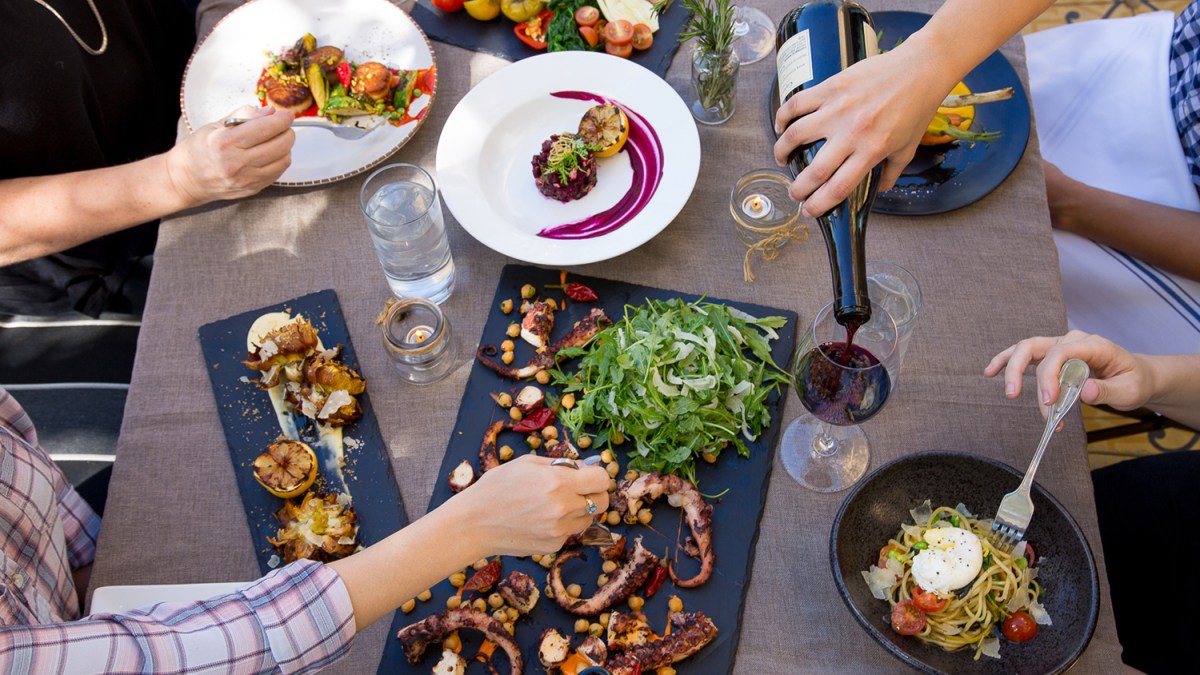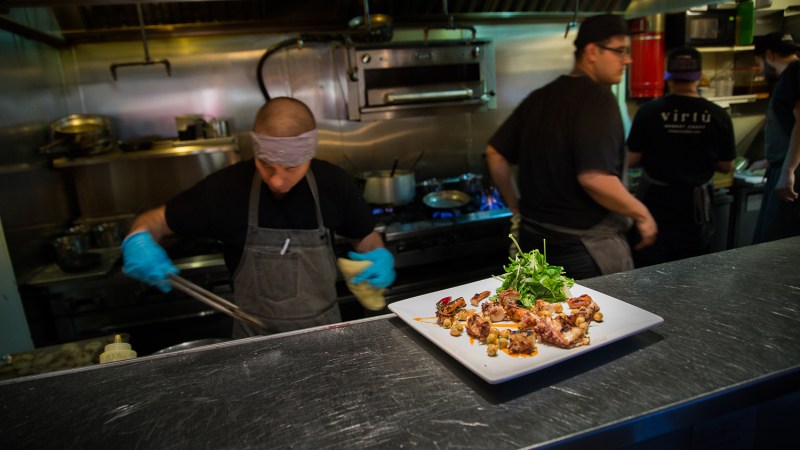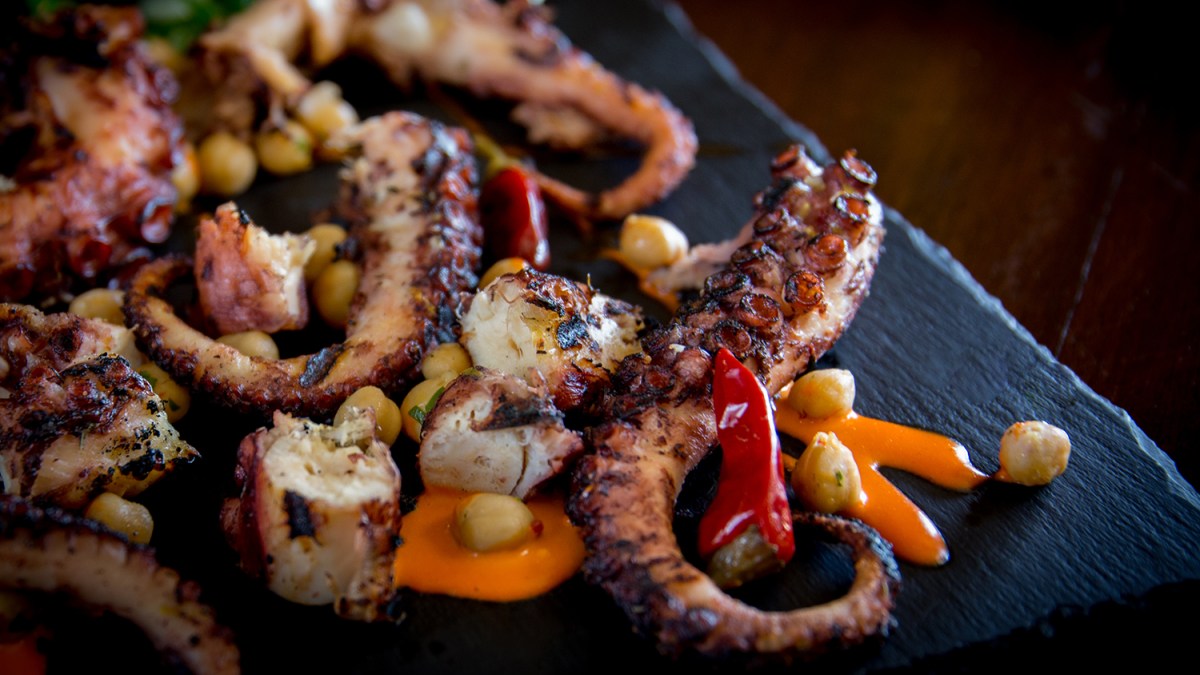Octopus is one of the toughest pieces of seafood to get right. If you cook the tentacled mollusk for either too long or not enough time, the texture will be way off and your result will be chewy, tough, or downright soggy meat. However, the task shouldn’t be daunting either, as cooking octopus at home can make for one of the simplest and most satisfying meals — once you get the technique right.

To guide us down the path of octopus enlightenment, we employed the help of Gio Osso, owner and executive chef of Virtú Honest Craft in Scottsdale, Arizona. Osso has been cooking ever since he could reach the countertop and attributes his culinary inspiration to summers spent with family in Southern Italy on a Calabrian farm. He graduated from culinary school in New Jersey and worked in restaurants in the Northeast until he was beckoned by mentor and chef Richard Lowack to come work for him in the pastry department of his new Phoenix restaurant. Eleven years later, Osso opened Scottsdale’s Virtú Honest Craft in 2013, which is inspired by the chef’s trips through Southern Italy. The restaurant has since garnered many awards, including a James Beard nomination and place on Thrillist’s list of the best new restaurants in America in 2014.
While Osso changes the menu at Virtú Honest Craft multiple times a week, one dish remains a constant: the octopus. It’s such a customer favorite — and Osso is such an expert at cooking it — that it’s always available for both returning and new guests to try. We asked chef Osso to share seven expert tips on how to cook octopus.
Spanish Octopus is Best
Osso prefers Spanish octopus for its sturdy texture and clean taste. “I find that Spanish octopus, between four and six pounds, is the best octopus to work with in a restaurant or at home,” he says. If you can’t find the Spanish variety, stick with an octopus in that same weight range for the best results.

Have a Wine Cork Handy
There’s an old wives’ tale that states the enzymes in a wine cork help to tenderize octopus if you add it alongside the mollusk in a pot of boiling water. As corks don’t actually contain any enzymes, science has proved this method to be false. But that doesn’t stop Osso, along with other chefs around the world, from using the trick anyway.
“I have asked numerous chefs why they do it as well, and no one I’ve asked knows why,” he says. “The reason I add the cork is because that’s how my grandmother and mother told me how to cook it. So my theory is, moms know best. Just do it — it works!”
Use a Pot With a Tight-Fitting Lid
When cooking an octopus on the stovetop, be sure to use a pot with a tight-fitting lid and always check to see if the pot is fully covered. “You do not want the liquid released to evaporate or the octopus will burn and stick to the bottom of the pot,” Osso says. “Not the outcome you’re looking for.”

Remove the Natural Juices Before Cooling
Sometimes it’s good to let meat and fish marinate in their own juices for awhile before serving, but that is not the case with octopus. In fact, it could ruin all of your hard work buy turning it into mush. “Once the octopus is fork tender, I immediately remove it from the natural juices and let it cool,” Osso says. “I don’t want to cool it in the juices because then the octopus will become waterlogged, and that will cause the octopus to just fall apart. You still want a little ‘tooth’ to the octopus, although it will be beautifully tender.”
Grilling Octopus Takes Time and Patience
Charred octopus is one of our favorite ways to eat the seafood, but Osso warns that it requires time and patience to get it just right. “Try not to move the octopus around on the grill too much as the octopus has this very thin purplish skin on the outside,” he says. “If you move the octopus too much, it can cause the skin to peel off the tentacles and leave you with just a white piece of octopus, which is not very appealing, yet still delicious.”
Wait for the octopus to obtain a nice char on the outside before turning or moving it, and always be gentle when you do so. In Osso’s (and our opinion), this creates the perfect texture for octopus: creamy on the inside with a crunch on the outside.

Marination is Key
Osso always marinates an octopus before grilling, as the meat really takes on the flavors once it’s charred into the protein. “The marinade I use is very simple: lemon juice, extra virgin olive oil, garlic, Calabrian chiles, and dried oregano,” he says. We recommend marinating it for two to three hours to really let the juices and spices soak in.
Don’t Waste Anything
“A lot of people think the heads are gross, and that couldn’t be farther from the truth,” Osso says. “One of the things I like to do is cut the heads into strips, bread them, and fry them up! It’s a much better alternative to calamari because calamari can be very tricky and turn into rubber bands if cooked one second longer than needed. These octopus heads will be tender and delicious — trust me!”



